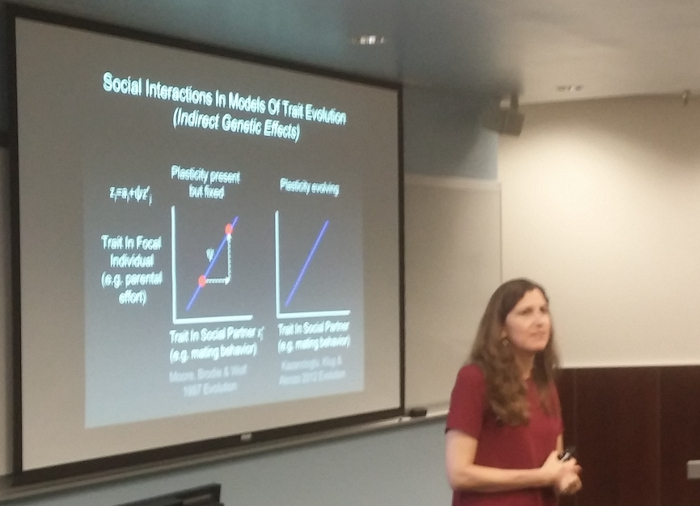NIMBioS Seminar Series
In conjunction with the interdisciplinary activities of the National Institute for Mathematical and Biological Synthesis (NIMBioS), a seminar series on topics in mathematical biology will be hosted at NIMBioS every other Tuesday at 3:30 p.m. (unless otherwise noted) in the Hallam Auditorium, Room 206, Claxton Building, 1122 Volunteer Blvd. Seminar speakers will focus on their research initiatives at the interface of mathematics and many areas of the life sciences. Light refreshments will be served in Room 205 beginning 30 minutes before each talk. Faculty and students from across the UT community are welcome to join us.
Speaker:
Dr. Suzanne Alonzo, Ecology and Evolutionary Biology, Univ. of California, Santa Cruz
Time/Date: Tuesday, April 11, 2017, 3:30*
Location:
Room 206, Claxton Building, 1122 Volunteer Blvd.
Topic:
The social side of sex: Male/female coevolution and social plasticity affect reproductive patterns
Abstract:
Extensive empirical and theoretical research has focused on understanding the diversity of reproductive patterns and behavioral interactions observed in nature. I have argued that considering both coevolutionary dynamics and social interactions can improve our ability to explain and predict this striking variation. In my talk, I will discuss why these dynamics are essential for understanding the evolution of male and female reproductive traits. I will first present the results of some general theory examining how social interactions affect evolutionary dynamics and discuss extensions of this theory to our understanding of specific reproductive behaviors. I will then present some data on how interactions between the sexes at mating and fertilization affect sexual selection, potentially driving the evolution of sperm allocation and paternal care in a Mediterranean fish (the ocellated wrasse, Symphodus ocellatus). Finally, I will discuss what these and other similar empirical patterns have to say about what theory and data are needed if we wish to improve our understanding of and capacity to predict the diversity of reproductive patterns observed in nature.
Suzanne Alonzo is a professor in the Department of Ecology and Evolutionary Biology at the University of California, Santa Cruz. Her research uses a combination of theory and empirical work on fishes to understand how interactions within and between the sexes affect the evolution of traits related to reproduction. Her research has focused on variety of topics including alternative reproductive tactics, sperm competition, sexual conflict parental care and female choice. Alonzo received a B.A. from the University of California, Berkeley in 1992 and a Ph.D. from the University of California, Santa Barbara in 1998.
*Join us for refreshments at 3 p.m.
Seminar Flyer (pdf)
![]() Watch seminar online. This video was streamed live. Live-streamed seminars are archived for later viewing on NIMBioS' YouTube channel.
Watch seminar online. This video was streamed live. Live-streamed seminars are archived for later viewing on NIMBioS' YouTube channel.
For more information about this and other NIMBioS Seminars, visit /seminars.

NIMBioS
1122 Volunteer Blvd., Suite 106
University of Tennessee
Knoxville,
TN 37996-3410
PH: (865) 974-9334
FAX: (865) 974-9461
Contact NIMBioS



